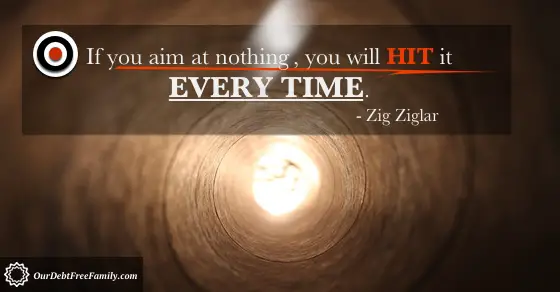Part 2 of a 3-Part Series on Goal Setting
At the end of July, my husband and I decided that we wanted to get out of debt. We had made the commitment, and we knew we needed a plan. But before figuring out the plan, we needed to get clear about our goals.
Goals are vital to success. As the late and great Zig Ziglar put it, “If you aim at nothing, you will hit it every time.”
We needed to define what success looked like to us so that when we reached our destination, we could celebrate our achievements.

In the first post of our Goal Setting Series, you laid the foundation for your goals, but that is only the beginning. Now it is time to write your goals the SMART way.
Writing Well-Constructed Goals
In order to give yourself a better chance of completing your goals, you must write them down.
In a study performed by the Dominican University of California, Dr. Gail Matthews found that participants who wrote down their goals were significantly more likely to achieve them than those who didn’t.
A well-written goal is SMART. SMART is an acronym that stands for Specific, Measurable, Actionable, Realistic, and Time-bound.
- Specific – A specific goal provides the details. For example, “Pay off my student loan of $14,245.63.”
- Measurable – For a goal to be measurable, there must be some way to measure its completion. In our example above, the balance of $14,245.63 is measurable. If I were to state my goal as “Pay off my loans,” this is neither specific (which loans?) nor measurable (how much?).
- Actionable – Your goal must be something that you have the power to take action on. In our example, I am going to “Pay off my loan.” Start your goal with an action verb, and you’ve got this one covered.
- Realistic – In order for your goal to be achievable, it must be realistic. While goals should stretch you and push you a little outside of your comfort zone, they need to be something that you can actually accomplish. “Pay off all of my $300,000 debt by next week” is a stretch goal for sure, but for our middle-class, single income family, this is highly unrealistic.
- Time-bound – Napoleon Hill said, “A goal is a dream with a deadline.” Deadlines push you to take action now. Without a deadline, you are merely hoping that one day you will reach your goal. “Pay off my student loan of $14,245.63 by December” is a SMART goal.
Use this acronym for each of the goals that you wrote down in Part 1 to SMART-en them up.

Next, Clarify Your WHY
After each goal, write down WHY this goal is important to you. Visualize yourself completing the goal and describe the emotions you will feel as a result of meeting each goal. Write down what meeting the goal will enable for your life.
If your goal is to lose 50 pounds, what will that make possible for your life? Perhaps your WHY is so that you can have the energy to play with your kids and live long enough to see your grandchildren graduate from college.
Reflecting back on the reasons why your goals are important to you will help keep you motivated when you come to an obstacle in your road to success.
You have made great progress on defining your goals, and at this point you have a few SMART goals written down. In the next post in our series, we will dive deeper into prioritizing and planning for your success.
What About You?
Participate in the conversation. What is one of your SMART goals? What is your WHY for making it happen? Share in the comments below.
“We needed to define what success looked like” <— yes! This is a great breakdown of writing goals, too. I always appreciate it when writers use well established sources like you did here. Must be the reporter in me! 🙂
Thank you, Catherine! That means a lot. 🙂
This is helpful. I’ve written out goals with these things in mind, but have never heard of the specific acronym. I think more people would actually accomplish their goals if they used this!
I think so too! Just the act of writing out your goals significantly increases your chances of succeeding, but going through this process and getting clear on what you want and why makes achieving your goals feel that much more doable.
Both as a teacher and a writer, I’ve been setting SMART goals for a long time, but they definitely translate well to personal spending. That “measurable” piece, together with a time element, can make all the difference.
I totally agree, Renée! I think those are the most important parts of setting SMART goals.
My SMART goal that I make every year is that I decide on a certain amount of emergency fund money that I want to have. It’s calculated based on my current income and saving a certain % of it, which I put right in my spreadsheet, next to the number that is my savings goal for the year, which itself is next to what my projected year savings balance would be if I stay on budget in terms of earnings and spending/paying debt!
I love that you’re a numbers and spreadsheet girl, too, Pech! Sounds like you have a great system!
SMART goals are a great idea for personal spending. Like Marlynn, I’ve only really used them in business, but they really translate.
Thanks, Kristi! I think they can be used in any area of our lives.
I use the SMART goal system too. I know sometimes I just don’t get specific enough with my goals.
I think that’s important. Once we’re clear on what we want, we can begin to figure out how to make it happen.
Ah I love SMART goals! We use them for business all the time but I love the application of them for personal spending too.
Great! Thanks, Marlynn! I appreciate you stopping by. 🙂
Actionable: keep an eye on spending. It’s easy to spend freely when you have no family to support, but at the same time it’s also easier to buckle down and make sacrifices without having to compromise with other family members.
Absolutely, Bill. Thanks for reading and taking action!
I have been reading Michael Hyatt and first heard him talk about this acronym when making goals. So helpful and applicable to so many different areas of people’s lives. This was a great topic to bring up.
I am a fan of Michael Hyatt’s too! Thanks, Laura! I appreciate you reading and commenting. 🙂